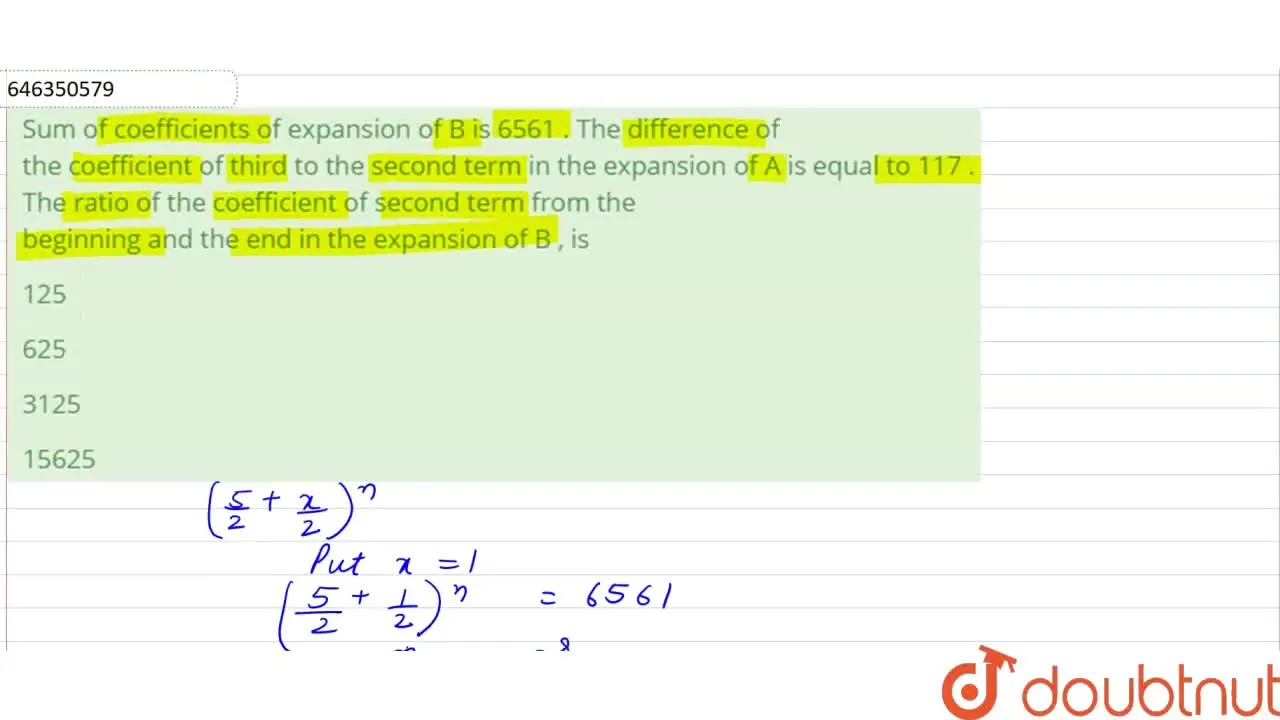Sum of coefficients of expansion of B is 6561 . The difference of
the coefficient of third to the second term in the expansion of A is equal to 117 .
The ratio of the coefficient of second term from the
beginning and the end in the expansion of B , is Solution in Punjabi
125
625
3125
15625
The correct Answer is:d
Since , sum of coefficient of B is 6561 .
∴(52+12)n=6561
⇒3n=6561⇒3n=38
∴n=8
coefficient of T2 in(5x2+x−22)8coefficient of T2 in(x−22+5x2)8=8C1(52)7(12)8C1(12)7(52)=56=15625
Related Playlists
- BOOK - ARIHANT MATHSCHAPTER - BIONOMIAL THEOREMEXERCISE - Binomial Theorem Exerciese 4 : Single Integer Answer Type Questions1videos
BIONOMIAL THEOREM
- BOOK - ARIHANT MATHSCHAPTER - BIONOMIAL THEOREMEXERCISE - Exercise (Single Integer Answer Type Questions)9videos
BIONOMIAL THEOREM
- BOOK - ARIHANT MATHSCHAPTER - BIONOMIAL THEOREMEXERCISE - Exercise (More Than One Correct Option Type Questions)15videos
BIONOMIAL THEOREM
- BOOK - ARIHANT MATHSCHAPTER - AREA OF BOUNDED REGIONSEXERCISE - Exercise (Questions Asked In Previous 13 Years Exam)23videos
AREA OF BOUNDED REGIONS
- BOOK - ARIHANT MATHSCHAPTER - CIRCLE EXERCISE - Exercise (Questions Asked In Previous 13 Years Exam)16videos
CIRCLE
Similar Questions
For integer n>1, the digit at unit's place in the number
100∑r=0r!+22n I05:45View SolutionIf (1+x+x2+x3)n=3n∑r=0brxrand3n∑r=0br=k,t h e n3n∑r=0rbr is
02:36View SolutionIf in the expansion of (1+x)m(1−x)n , the coefficients
of x and x2 are 3 and - 6 respectively, the value of m and n are04:12View SolutionArea of the region
{(x,y)∈R2:y≥√|x+3|,5y≤x+9≤15} is equal to01:50View SolutionFind the derivative of (ax4−bx2+cosx)
04:21View SolutionIf the sum of the coefficients in the expansion of (1+2x)^(n) is 6561, the greatest term in the expansion for x=(1)/(2), is
View SolutionIf the sum of the coefficients in the expansion of (1+2x)^(n) is 6561 ,then the greatest coefficient in the expansion is
View SolutionIn the expansion of (x+y)^(n) ,if the binomial coefficient of the third term is greater by 9 then that of the second term,then the sum of the binomial coefficients of the terms occupying to odd places is
View SolutionIf the sum of the coefficients in the expansion of
(1+2x)n is 6561 , the greatest term in the expansion for x=1/2, is04:37View SolutionIf the sum of the coefficients in the expansion of
(1+2x)n is 6561 , then the greatest coefficients in the expansion, is01:56View SolutionA=(52+x2)n,B=(1+3x)m
Sum of coefficients of expansion of B is 6561 . The difference of
the coefficient of third to the second term in the expansion of A is equal to 117 .
The value of m is01:57View SolutionSum of coefficients of expansion of B is 6561 . The difference of
the coefficient of third to the second term in the expansion of A is equal to 117 .
If nm is divided by 7 , the remainder is02:11View SolutionSum of coefficients of expansion of B is 6561 . The difference of
the coefficient of third to the second term in the expansion of A is equal to 117 .
The ratio of the coefficient of second term from the
beginning and the end in the expansion of B , is02:13View SolutionThe sum of the coefficients in the binomial expansion of (1x+2x)n is equal to 6561. The constant term in the expansion is
03:39View SolutionA=(52+x2)n,B=(1+3x)m
Sum of coefficients of expansion of B is 6561 . The difference of
the coefficient of third to the second term in the expansion of A is equal to 117 .
The value of m is01:21View SolutionSum of coefficients of expansion of B is 6561 . The difference of
the coefficient of third to the second term in the expansion of A is equal to 117 .
If nm is divided by 7 , the remainder is02:17View Solution


